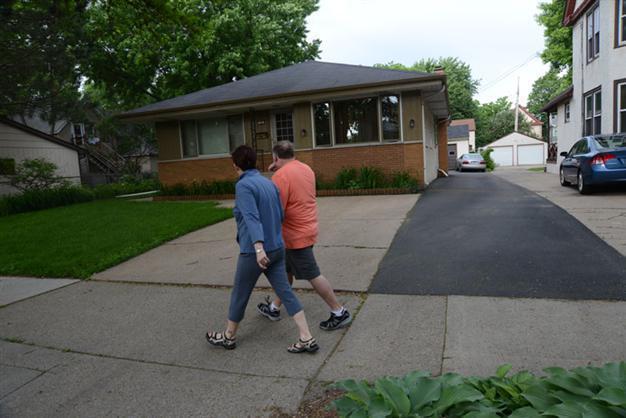Nazi unit leader's US life prompts shock, denial
MINNEAPOLIS - The Associated Press

People walk past the house in Minneapolis where Michael Karkoc lives. AP photo
The revelation that a former commander of a Nazi SS-led military unit has lived quietly in the U.S. for the past six decades came as a shock to people who knew him, prompted harsh condemnations from World War II survivors in the U.S. and Europe, and led prosecutors in Poland to say they would investigate. His family said he was "never a Nazi."An Associated Press investigation found that 94-year-old Michael Karkoc served as a top commander in the Ukrainian Self-Defense Legion during World War II. The unit is accused of wartime atrocities, including the burning of villages filled with women and children. Wartime records don't show that Karkoc had a direct hand in war crimes, though records indicate he lied about his military past when immigrating to the U.S.
Late Friday, Karkoc's son, Andriy Karkos, read a statement accusing the AP of defaming Karkoc. He pointed to the portion of the AP story that said records don't show Karkoc had a direct hand in war crimes.
"That's the god's honest truth," Karkos said. "My father was never a Nazi."
Karkos said the family wouldn't comment further until it has obtained its own documents and reviewed witnesses and sources.
Karkoc had earlier declined to comment on his wartime service when approached by the AP, and repeated efforts to arrange an interview through his son were unsuccessful.
"I know him personally. We talk, laugh. He takes care of his yard and walks with his wife," his next-door neighbor in Minnesota, Gordon Gnasdoskey, said Friday. Gnasdoskey, the grandson of a Ukrainian immigrant himself, said he was disturbed by the revelations.
Sam Rafowitz, an 88-year-old Jewish resident, grew up in Warsaw, Poland, and spent four years working in concentration camps. He took a hard line after hearing the news about Karkoc.
"I think they should put him on trial," Rafowitz said.
Poland's National Remembrance Institute, which prosecutes wartime crimes, said its prosecutors would investigate Karkoc's "possible role" in crimes committed by the legion and would provide "every possible assistance" in gathering evidence for the U.S. justice system. The U.S. government has previously used lies in immigration papers to deport dozens of suspected Nazi war criminals.
Karkoc's unit was associated with the 1944 Warsaw uprising, in which Nazis brutally suppressed a Polish rebellion against German occupation. Karkoc lied to American immigration officials to get into the U.S., telling authorities in 1949 that he had performed no military service during the war. He became a naturalized U.S. citizen in 1959.
In Washington, Justice Department spokesman Michael Passman said the agency was aware of the AP story.
"While we do not confirm or deny the existence of specific investigations, I can say as a general matter that the Department of Justice continues to pursue all credible allegations of participation in World War II Nazi crimes by US citizens and residents," Passman said.
Gnasdoskey said the neighborhood where he and Karkoc live was once a destination for displaced persons from Slavic countries, Ukraine, Poland and other countries in the region. Karkoc and his family are longtime members of the St. Michael's and St. George's Ukrainian Orthodox Church, among several Catholic and Orthodox churches in the neighborhood.
"All the time I am here, I know him as a good man, a good citizen," said the Rev. Evhen Kumka, the church's pastor. "He's well known in the congregation."
Kumka wouldn't say whether he'd spoken to Karkoc about his past, but said he was skeptical.
"I don't think everything is correct," Kumka said. "As I know him, he is a good example for many people."
Karkoc worked as a carpenter and appeared in a 1980 issue of Carpenter magazine among a group celebrating 25 years of union membership. He was a member and a secretary in the local branch of the Ukrainian National Association, a fraternal organization, and voting records obtained by the AP show he regularly voted in city, state and general elections.
News of Karkoc's past prompted anger from World War II survivors overseas, in countries where the Ukrainian Self-Defense Legion was active.
In Poland, Honorata Banach told the AP she wants Karkoc to apologize. She was 20 when she fled the Polish village of Chlaniow before it was burned down by the legion.
"There was so much suffering, so many orphans, so much pain," Banach said. She and her mother returned the day after the attack, she said, to see that "everything was burned down, even the fences, the trees. I could not even find my house."
Survivors told her the Ukrainian legion did it, she said.
Rafowitz said he lost his mother and other relatives at the Majadenk concentration camp in Lublin, in German-occupied Poland. He said soldiers in the camp were German but that it was run by Ukrainians.
"You don't forget," Rafowitz said. "For me, it's been almost close to 70 years those things happened, but I still know about it. I still remember everything."
















